Damodaran A. Applied corporate finance
Подождите немного. Документ загружается.

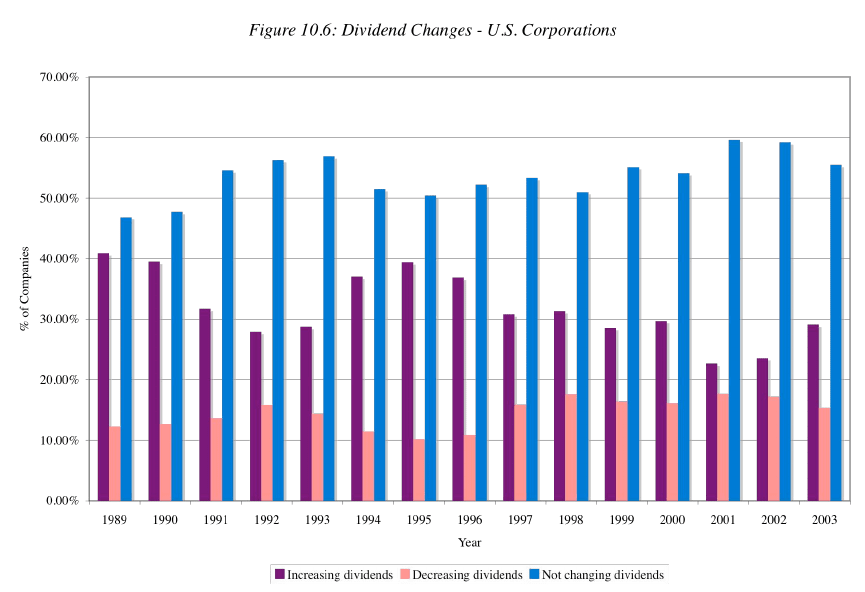
9
9
the firm’s concern about its capability to maintain higher dividends in future periods.
Another is the negative market view of dividend decreases, and the consequent drop in
the stock price. Figure 10.6 provides a summary of the percentages of all firms that
increased, decreased, or left unchanged their annual dividends per share from 1989 to
1998.
a
Estimated using Compustat annual database.
As you can see, in most years the number of firms that do not change their dollar
dividends far exceeds the number that do. Among the firms that change dividends, a
much higher percentage, on average, increase dividends than decrease them.
Dividends Follow a Smoother Path than Earnings
As a result of the reluctance of firms to raise dividends until they feel able to
maintain them, and to cut dividends unless they absolutely have to, dividends follow a
much smoother path than earnings. This view that dividends are not as volatile as
earnings on a year-to-year basis is supported by a couple of empirical facts. First, the
variability in historical dividends is significantly lower than the variability in historical
earnings. Using annual data on aggregate earnings and dividends from 1960 to 2003, for
10
10
instance, the standard deviation of dividends is 5% while the standard deviation in
earnings is about 14%. Second, the standard deviation in earnings yields across
companies is significantly higher than the standard deviation in dividend yields. In other
words, the variation in earnings yields across firms is much greater than the variation in
dividend yields.
A Firm’s Dividend Policy Tends To Follow The Life Cycle Of The Firm
In chapter 7, we introduced the link between a firm’s place in the life cycle and its
financing mix and choices. In particular, we noted five stages in the growth life cycle –
start up, rapid expansion, high growth, mature growth and decline. In this section, we will
examine the link between a firm’s place in the life cycle and its dividend policy. Not
surprisingly, firms generally adopt dividend policies that best fit where they are currently
in their life cycles. For instance, high-growth firms with great investment opportunities
do not usually pay dividends, whereas stable firms with larger cash flows and fewer
projects tend to pay more of their earnings out as dividends. Figure 10.7 looks at the
typical path that dividend payout follows over a firm’s life cycle.
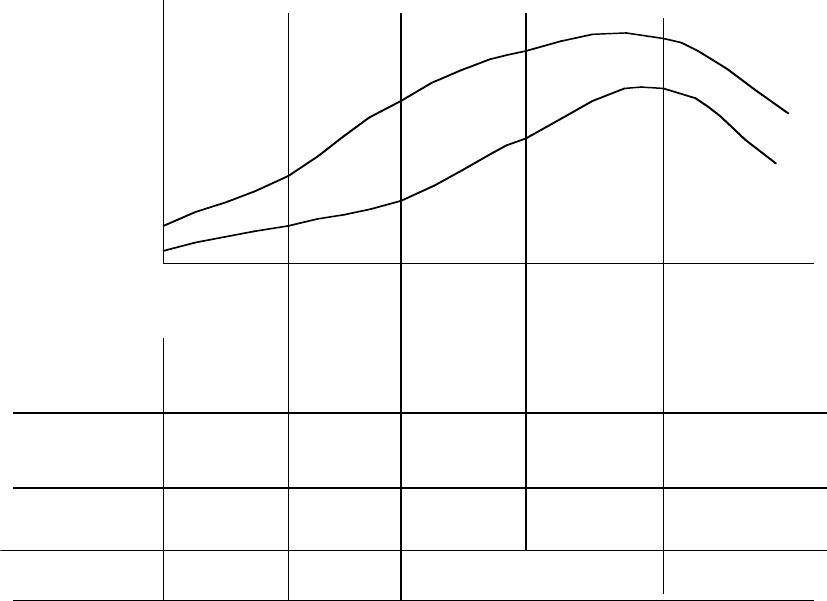
11
11
Stage 2
Rapid Expansion
Stage 1
Start-up
Stage 4
Mature Growth
Stage 5
Decline
Figure 10.7: Life Cycle Analysis of Dividend Policy
Years
Years
Capacity to pay
dividends
Revenues
Earnings
None
None
Increasing
High
External funding
needs
High, but
constrained by
infrastructure
High, relative
to firm value.
Moderates, relative
to firm value.
Low, as projects dry
up.
Internal financing
Low, as projects dry
up.
Very low
Stage 3
High Growth
Negative or
low
Negative or
low
Low, relative to
funding needs
High, relative to
funding needs
More than funding needs
Growth stage
$ Revenues/
Earnings
This intuitive relationship between dividend policy and growth is emphasized when we
look at the relationship between a firm’s payout ratio and its expected growth rate. For
instance, we classified firms on the New York Stock Exchange in January 2004 into six
classes, based upon analyst estimates of expected growth rates in earnings per share for
the next 5 years, and estimated the dividend payout ratios and dividend yields for each
class; these are reported in Figure 10.8.
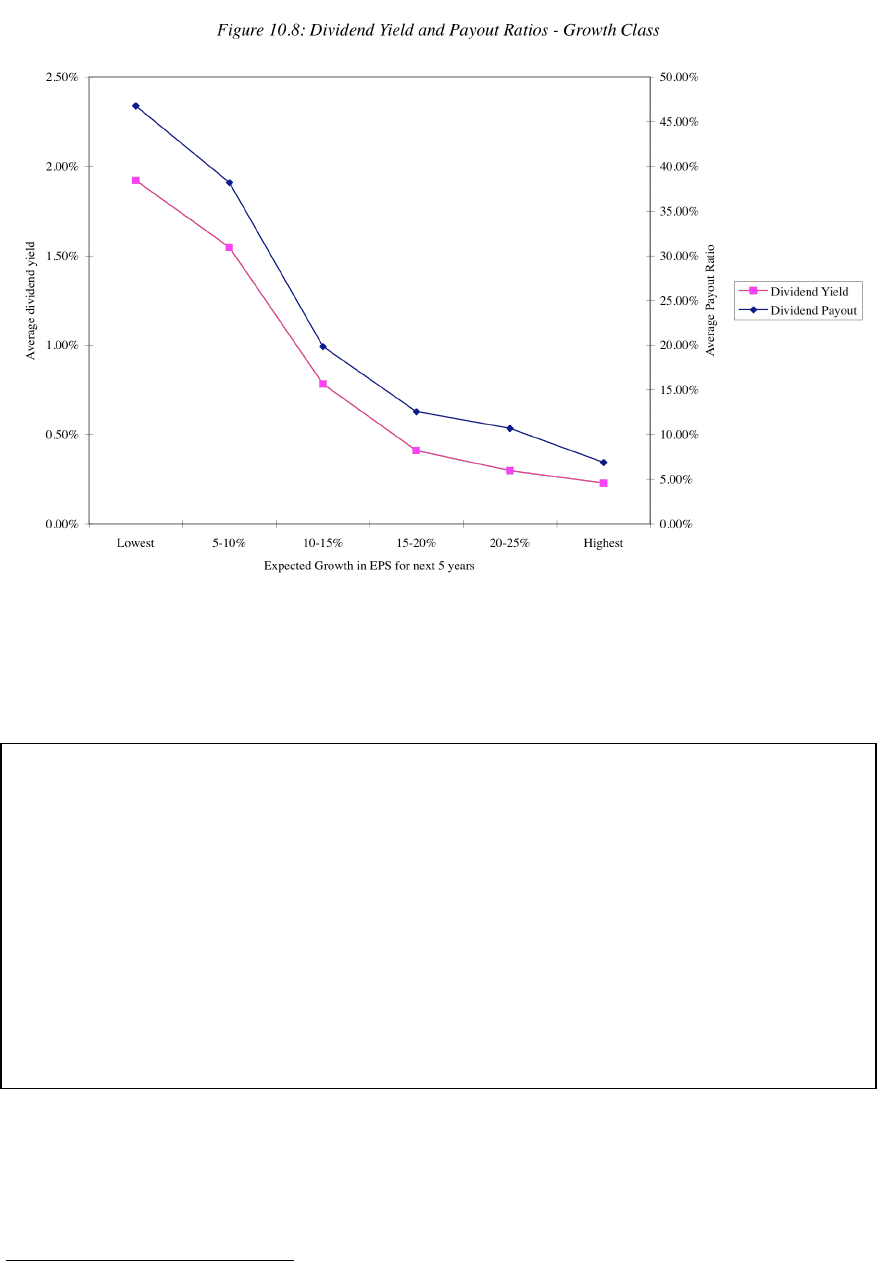
12
12
Source: Value Line Database
The firms with the highest expected growth rates pay the lowest dividends, both as a
percent of earnings (payout ratio) and as a percent of price (dividend yield).
3
10.3. ☞: Dividend Policy at Growth Firms
Assume that you are following a growth firm, whose growth rate has begun easing.
Which of the following would you most likely observe in terms of dividend policy at the
firm?
a. An immediate increase of dividends to reflect the lower reinvestment needs.
b. No change in dividend policy, and an increase in the cash balance.
c. No change in dividend policy, and an increase in acquisitions of other firms
Explain.
3
These are growth rates projected by Value Line for firms in April 1999.
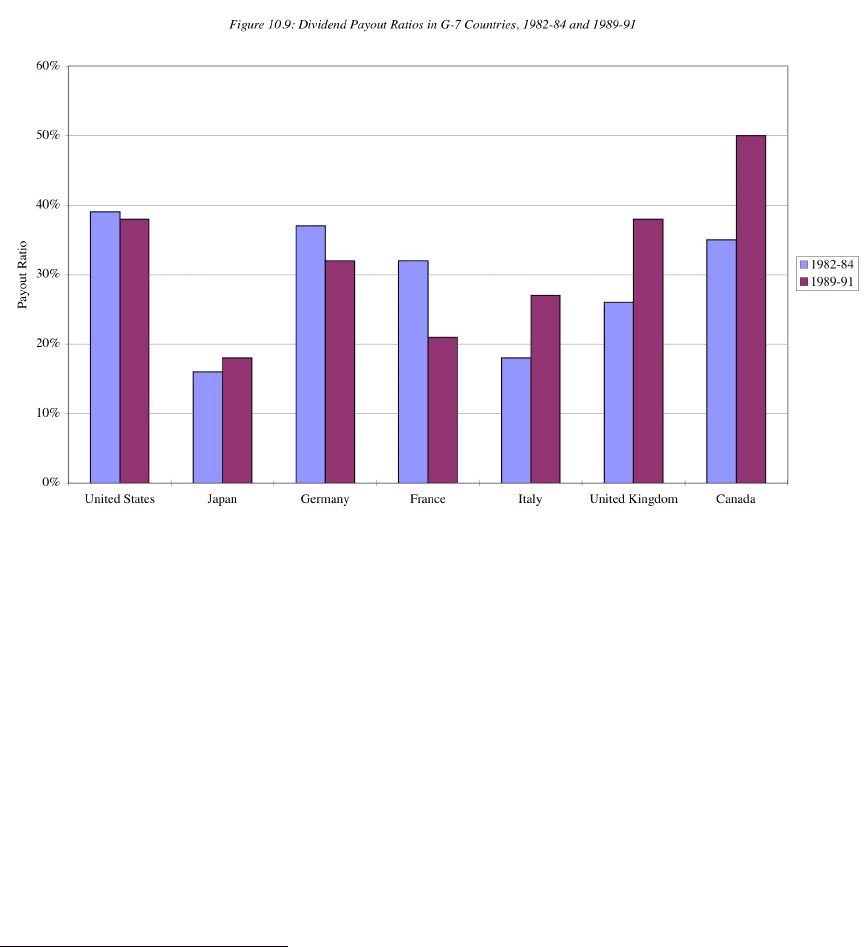
13
13
Differences in Dividend Policy across Countries
Figures 10.5 to 10.8 showed several trends and patterns in dividend policies at
U.S. companies.
4
They share some common features with firms in other countries, and
there are some differences. As in the United States, dividends in other countries are sticky
and follow earnings. However, there are differences in the magnitude of dividend payout
ratios across countries. Figure 10.9 shows the proportion of earnings paid out in
dividends in the G-7 countries in 1982-84 and again in 1989-91.
a
Source: Rajan and Zingales
These differences can be attributed to:
1. Differences in Stage of Growth: Just as higher growth companies tend to pay out less
of their earnings in dividends (see Figure 10.8), countries with higher growth pay out less
in dividends. For instance, Japan had much higher expected growth in 1982-84 than the
other G-7 countries and paid out a much smaller percentage of its earnings as dividends.
2. Differences in Tax Treatment: Unlike the United States, where dividends are double
taxed, some countries provide at least partial protection against the double taxation of
4
Rajan, R. and L. Zingales, What do we know about capital structure? Some Evidence from International
Data, Journal of Finance, 1995, v50, 1421-1460.
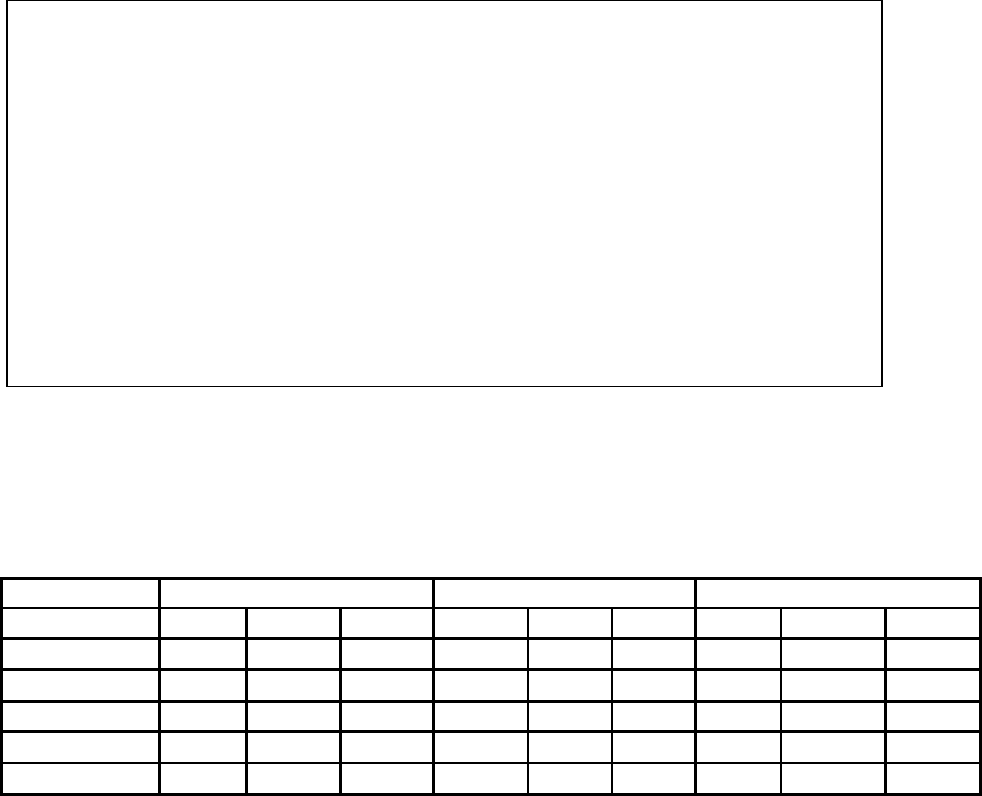
14
14
dividends. For instance, Germany taxes corporate retained earnings at a higher rate than
corporate dividends.
3. Differences in Corporate Control: When there is a separation between ownership and
management, as there is in many large publicly traded firms, and where stockholders
have little control over managers, the dividends paid by firms will be lower. Managers,
left to their own devices, have a much greater incentive to accumulate cash than do
stockholders.
Not surprisingly, the dividend payout ratios of companies in emerging markets are
much lower than the dividend payout ratios in the G-7 countries. The higher growth and
relative power of incumbent management in these countries contribute to keeping these
payout ratios low.
10.4. ☞: Dividend policies and Stock Buyback Restrictions
Some countries do not allow firms to buy back stock from their stockholders. Which of
the following would you expect of dividend policies in these countries (relative to
countries that don’t restrict stock buybacks)?
a. Higher portion of earnings will be paid out in dividends; More volatile dividends;
b. Lower portion of earnings will be paid out in dividends; More volatile dividends
c. Higher portion of earnings will be paid out in dividends; Less volatile dividends;
d. Lower portion of earnings will be paid out in dividends; Less volatile dividends;
Explain
Illustration 10.1: Dividends, Dividend Yields and Payout Ratios
In the illustration that follows, we will examine the dollar dividends paid at
Disney, Aracruz and Deutsche Bank between 2001 and 2003. Each year, we will also
compute the dividend yield and dividend payout ratio for each firm.
Deutsche Bank
Disney
Aracruz
2001
2002
2003
2001
2002
2003
2001
2002
2003
DPS
€ 1.30
€ 1.30
€ 1.30
$0.21
$0.21
$0.21
R$ 0.14
R$ 0.18
R$ 0.32
EPS
€ 2.44
€ 0.64
€ 0.27
$0.11
$0.60
$0.65
R$ 0.20
R$ 0.01
R$ 0.85
Stock Price
€ 79.40
€ 43.90
€ 65.70
$20.72
$16.31
$23.33
R$ 3.91
R$ 6.76
R$ 10.60
Dividend Yield
1.64%
2.96%
1.98%
1.01%
1.29%
0.90%
3.53%
2.69%
3.00%
Dividend Payout
53.28%
203.13%
481.48%
190.91%
35.00%
32.31%
69.01%
1818.44%
37.41%

15
15
Of the three companies, Aracruz had the highest dividend yield across the three years.
Disney and Deutsche paid the same dividends per share each year, but the volatility in
their stock prices and earnings made the payout ratios and dividend yields volatile. In
fact, Deutsche maintained its dividends at 1.30 Euros per share in the face of declining
earnings per share in 2002 and 2003, a testimonial to the stickiness of dividends.
As noted earlier in the book, Aracruz, like most Brazilian companies, maintains
two classes of shares – voting share (called common and held by insiders) and non-voting
shares (called preferred shares and held by outside investors). The dividend policies are
different for the two classes, with preferred shares getting higher dividends. In fact, the
failure to pay a mandated dividend to preferred stockholders (usually set at a payout ratio
of 35%) can result in preferred stockholders getting some voting control of the firm.
Effectively, this puts a floor on the dividend payout ratio.
When Are Dividends Irrelevant?
There is a school of thought that argues that what a firm pays in dividends is
irrelevant and that stockholders are indifferent about receiving dividends. Like the capital
structure irrelevance proposition, the dividend irrelevance argument has its roots in a
paper crafted by Miller and Modigliani.
5
The Underlying Assumptions
The underlying intuition for the dividend irrelevance proposition is simple. Firms
that pay more dividends offer less price appreciation but must provide the same total
return to stockholders, given their risk characteristics and the cash flows from their
investment decisions. Thus, there are no taxes, or if dividends and capital gains are taxed
at the same rate, investors should be indifferent to receiving their returns in dividends or
price appreciation.
For this argument to work, in addition to assuming that there is no tax advantage
or disadvantage associated with dividends, we also have to assume the following:
5
Miller, M. and F. Modigliani, 1961, Dividend Policy, Growth and the Valuation of Shares, Journal of
Business, 411-433.

16
16
• There are no transactions costs associated with converting price appreciation into
cash, by selling stock. If this were not true, investors who need cash urgently might
prefer to receive dividends.
• Firms that pay too much in dividends can issue stock, again with no flotation or
transactions costs, to take on good projects. There is also an implicit assumption that
this stock is fairly priced.
• The investment decisions of the firm are unaffected by its dividend decisions, and the
firm’s operating cash flows are the same no matter which dividend policy is adopted.
• Managers of firms that pay too little in dividends do not waste the cash pursuing their
own interests (i.e., managers with large free cash flows do not use them to take on
bad projects).
Under these assumptions, neither the firms paying the dividends nor the stockholders
receiving them will be adversely affected by firms paying either too little or too much in
dividends.
10.5. ☞: Dividend Irrelevance
Based upon the Miller Modigliani assumptions, dividends are least likely to affect value
for the following types of firms
a. Small companies with substantial investment needs.
b. Large companies with significant insider holdings.
c. Large companies with significant holdings by pension funds (which are tax exempt)
and minimal investment needs.
Explain.
A Proof of Dividend Irrelevance
To provide a formal proof of irrelevance, assume that LongLast Corporation, an
unlevered firm manufacturing furniture, has operating income after taxes of $ 100
million, growing at 5% a year, and that its cost of capital is 10%. Further, assume that
this firm has reinvestment needs of $ 50 million, also growing at 5% a year, and that
there are 105 million shares outstanding. Finally, assume that this firm pays out residual
cash flows as dividends each year. The value of LongLast Corporation can be estimated
as follows:
17
17
Free Cash Flow to the Firm = EBIT (1- tax rate) – Reinvestment needs
= $ 100 million - $ 50 million = $ 50 million
Value of the Firm = Free Cash Flow to Firm (1+g) / (WACC - g)
= $ 50 (1.05) / (.10 - .05) = $ 1050 million
Price per share = $ 1050 million / 105 million = $ 10.00
Based upon its cash flows, this firm could pay out $ 50 million in dividends.
Dividend per share = $ 50 million/105 million = $ 0.476
Total Value per Share = $ 10.00 + $ 0.48 = $10.476
The total value per share measures what stockholders gets in price and dividends from
their stock holdings.
Scenario 1: LongLast doubles dividends
To examine how the dividend policy affects firm value, assume that LongLast
Corporation is told by an investment banker that its stockholders would gain if the firm
paid out $ 100 million in dividends, instead of $ 50 million. It now has to raise $ 50
million in new financing to cover its reinvestment needs. Assume that LongLast
Corporation can issue new stock with no issuance cost to raise these funds. If it does so,
the firm value will remain unchanged, since the value is determined not by the dividend
paid but by the cash flows generated on the projects. Since the growth rate and the cost of
capital are unaffected, we get:
Value of the Firm = $ 50 (1.05) / (.10 - .05) = $ 1050 million
The existing stockholders will receive a much larger dividend per share, since dividends
have been doubled:
Dividends per share = $ 100 million/105 million shares = $ 0.953
In order to estimate the price per share at which the new stock will be issued, note that
after the new stock issue of $ 50 million, the old stockholders in the firm will own only
$1000 million of the total firm value of $ 1050 million.
Value of the Firm for existing stockholders after dividend payment = $ 1000 million
Price per share = $ 1000 million / 105 million = $ 9.523
The price per share is now lower than it was before the dividend increase, but it is exactly
offset by the increase in dividends.
Value accruing to stockholder = $ 9.523 + $ 0.953 = $ 10.476

18
18
Thus, if the operating cash flows are unaffected by dividend policy, we can show
that the firm value will be unaffected by dividend policy and that the average stockholder
will be indifferent to dividend policy, since he or she receives the same total value (price
+ dividends) under any dividend payment.
Scenario 2: LongLast stops paying dividends
To consider an alternate scenario, assume that LongLast Corporation pays out no
dividends and retains the residual $50 million as a cash balance. The value of the firm to
existing stockholders can then be computed as follows:
Value of Firm = Present Value of After-tax Operating CF + Cash Balance
= $ 50 (1.05) / (.10 - .05) + $ 50 million = $1100 million
Value per share = $ 1100 million / 105 million shares = $10.48
Note that the total value per share remains at % 10.48. In fact, as shown in Table 10.1,
the value per share remains $10.48, no matter how much the firm pays in dividends.
Table 10.1: Value Per Share to Existing Stockholders from Different Dividend Policies
Value of Firm
Dividends
Value to Existing
Price
Dividends
Total Value
(Operating CF)
Stockholders
per share
per share
per share
$1,050
$ -
$1,100
$ 10.48
$ -
$ 10.48
$1,050
$ 10.00
$1,090
$ 10.38
$ 0.10
$ 10.48
$1,050
$ 20.00
$1,080
$ 10.29
$ 0.19
$ 10.48
$1,050
$ 30.00
$1,070
$ 10.19
$ 0.29
$ 10.48
$1,050
$ 40.00
$1,060
$ 10.10
$ 0.38
$ 10.48
$1,050
$ 50.00
$1,050
$ 10.00
$ 0.48
$ 10.48
$1,050
$ 60.00
$1,040
$ 9.90
$ 0.57
$ 10.48
$1,050
$ 70.00
$1,030
$ 9.81
$ 0.67
$ 10.48
$1,050
$ 80.00
$1,020
$ 9.71
$ 0.76
$ 10.48
$1,050
$ 90.00
$1,010
$ 9.62
$ 0.86
$ 10.48
$1,050
$ 100.00
$1,000
$ 9.52
$ 0.95
$ 10.48
When LongLast Corporation pays less than $ 50 million in dividends, the cash accrues in
the firm and adds to its value. The increase in the stock price again is offset by the loss of
